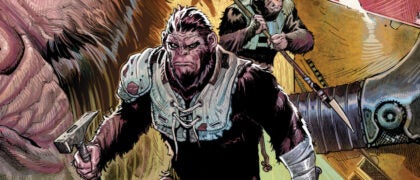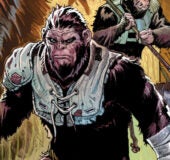One
Jinn and Phyllis were spending a wonderful holiday, in space, as far away as possible from the inhabited stars.
In those days interplanetary voyages were an everyday occurrence, and interstellar travel not uncommon. Rockets took tourists to the wondrous sites of Sirius, or financiers to the famous stock exchanges of Arcturus and Aldebaran. But Jinn and Phyllis, a wealthy leisured couple, were distinguished in their cosmos for their originality and a few grains of poetry. They wandered over the universe for their pleasure—by sail.
Their ship was a sort of sphere with an envelope—the sail—which was miraculously fine and light and moved through space propelled by the pressure of light-radiation. Such a machine, left to its own devices in the vicinity of a star (though far enough away for the field of gravity not to be too power- ful), will always move in a straight line in the opposite direction to the star; but since Jinn and Phyllis’ stellar system contained three suns that were relatively close to one another, their vessel received rays of light along three different axes. Jinn had therefore conceived an extremely ingenious method of steering. His sail was lined inside with a series of black blinds that he could roll up or unroll at will, thus changing the effect of the light-pressure by modifying the reflecting power of certain sections. Furthermore, this elastic envelope could be stretched or contracted as the navigator pleased. Thus, when Jinn wanted to increase his speed, he gave it the biggest diameter possible. It would then take the blasts of radiation on an enormous surface and the vessel would hurtle through space at a furious velocity, which made his mate Phyllis quite dizzy. He would also be overcome by vertigo, and they would then cling passionately to each other, their gaze fixed on the mysterious and distant depths to which their flight propelled them. When, on the other hand, they wanted to slow down, Jinn pressed a button. The sail would shrink until it became a sphere just big enough to contain them both, packed tightly together. The effect of the light became negligible, and this minute bubble, reduced to nothing more than its own inertia, seemed motionless, as though suspended in the void by an invisible thread. The young couple would spend rapturous idle hours in this reduced universe, erected on their own scale and for them alone, which Jinn compared to a becalmed sailing ship and Phyllis to the air bubble of the sea spider.
Jinn knew a number of other tricks, considered as the height of art by sailing cosmonauts: for example, making use of the shadows of the planets and certain satellites in order to change course. He imparted this skill to Phyllis, who was now almost as accomplished as he himself and often more daring. When she held the tiller, she would sometimes fire a broadside that swept them right to the borders of the stellar system, heedless of the resulting magnetic storm, which would start to upset the light-rays and to shake their skiff like a cockleshell. On two or three occasions, waked up with a start by the tempest, Jinn had had quite a struggle snatching the tiller from her and, in order to run for shelter as quickly as possible, starting the auxiliary rocket, which they made it a point of honor never to use except in case of danger.
One day Jim and Phyllis were lying side by side in the middle of their spacecraft without a care in the world, making the most of their holiday by exposing themselves to the rays of their three suns. Eyes closed, Jinn was thinking only of his love for Phyllis. Phyllis lay stretched out on her side, gazing at the immensity of the universe and letting herself be hypnotized, as she often did, by the cosmic sensation of the void.
All of a sudden she came out of her trance, wrinkled her brow, and sat up. An unusual flash of light had streaked across this void. She waited a few seconds and saw a second flash, like a ray being reflected off a shiny object. The cosmic sense she had acquired in the course of these cruises could not deceive her. Moreover, Jinn, when it was pointed out to him, agreed with her, and it was inconceivable that he should make a mistake in this matter: a body sparkling in the light was floating through space, at a distance they could not yet assess. Jinn picked up a pair of binoculars and focused them on the mysterious object, while Phyllis leaned on his shoulder.
“It’s not a very big object,” he said. “It seems to be made of glass. . . . No, let me look. It’s drawing closer. It’s going faster than we are. It looks like . . .”
A puzzled expression came into his eyes. He lowered the binoculars, which she at once snatched up.
“It’s a bottle, darling.”
“A bottle!”
She looked at it, in turn.
“Yes, it’s a bottle. I can see it quite clearly. It’s made of light-colored glass. It’s corked; I can see the seal. There’s something white inside that looks like paper—a message, obviously. Jinn, we’ve got to get hold of it!”
Jinn was of the same opinion and had already embarked on some skillful maneuvers to place the sphere on the trajectory of the unusual body. He soon succeeded and then reduced his own speed to enable it to catch up with him. Meanwhile Phyllis donned her diving suit and made her way out of the sail by the double trap door. There, holding onto a rope with one hand and brandishing a long- handled scoop in the other, she stood in readiness to retrieve the bottle.
It was not the first time they had come across strange bodies, and the scoop had already been in use. Sailing at low speed, sometimes completely motionless, they had enjoyed surprises and made discoveries that were precluded to travelers by rocket. In her net Phyllis had already gathered up remnants of pulverized planets, fragments of meteorites that had come from the depths of the universe, and pieces of satellites launched at the outset of the conquest of space. She was very proud of her collection; but this was the first time they had come across a bottle, and a bottle containing a message—of that she was certain. She trembled from head to foot with impatience, gesticulating like a spider on the end of its thread as she shouted down the telephone to her companion:
“Slower, Jinn. . . . No, a bit faster than that, it’s going to pass us. . . . Starboard. . . . Now hard to port. . . . Hold it. . . . I’ve got it!”
She gave a triumphant cry and came back inside with her trophy.
It was a largish bottle and its neck had been carefully sealed. A roll of paper could be seen inside.
“Jinn, break it open, hurry up!” Phyllis begged, stamping her foot.
Less impatient, Jinn methodically chipped off the sealing wax. But when the bottle was thus opened, he saw that the paper was stuck fast and could not be shaken out. He therefore yielded to his mate’s entreaties and smashed the glass with a hammer. The paper unrolled of its own accord. It consisted of a large number of very thin sheets, covered with tiny handwriting. The message was written in the language of the Earth, which Jinn knew perfectly, having been partly educated on that planet.
An uncomfortable feeling, however, restrained him from starting to read a document that had fallen into their hands in such an inconguous manner; but Phyllis’ state of excitement decided him. She was not so well acquainted with the language of the Earth and needed his help.
“Jinn, please!”
He reduced the volume of the sphere so that it floated idly in space, made sure that there was no obstacle in front of them, then lay down beside his companion and began to read the manuscript.
Copyright © 2001 by Pierre Boulle. All rights reserved. No part of this excerpt may be reproduced or reprinted without permission in writing from the publisher.









